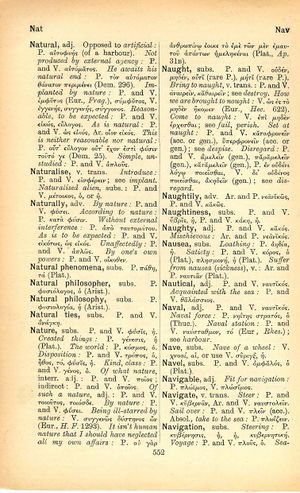nausea
τἄλλαι ... γυναῖκες ... ἀπήλαἁν τὼς ἄνδρας ἀπὸ τῶν ὑσσάκων → the other women diverted the men from their vaginas
English > Greek (Woodhouse)
subs.
Loathing: P. ἀηδία, ἡ. Satiety: P. and V. κόρος, ὁ (Plat.), πλησμονή, ἡ (Plat.). Suffer from nausea (sickness), v.: Ar. and P. ναυτιᾶν (Plat.).
Latin > English (Lewis & Short)
nausĕa: or nausĭa, ae, f., = ναυσία,
I sea-sickness.
I Lit.: ne nauseae molestiam suscipias aeger, Cic. Fam. 16, 11, 1: navigavimus sine timore et nauseā, id. Att. 5, 13, 1: nauseā pressus, Cels. 1, 3.—
II Transf., in gen., sickness, nausea; vomiting (syn. fastidium): nausea segnis, quae bilem movet nec effundit, Sen. Ep. 53, 3: cruditates, quae nauseam faciunt, Plin. 26, 11, 69, § 112: elaeomeli non sine nauseā alvum solvit, id. 23, 4, 50, § 96: nauseam fluentem coërcere. Hor. Epod. 9, 35: ubi libido veniet nauseae, Cato, R. R. 156.—
B Trop., a qualm, nausea: cotidianam refice nauseam nummis. Audire gratis, Afer, ista non possum, Mart. 4, 37, 9.

